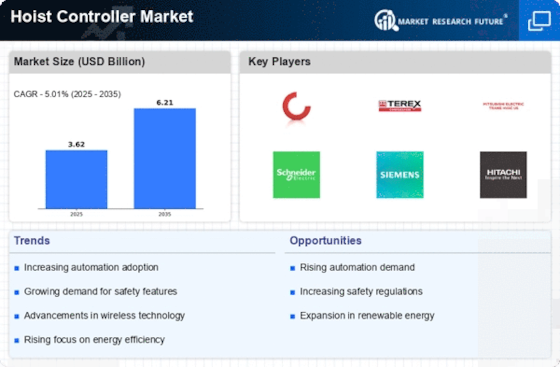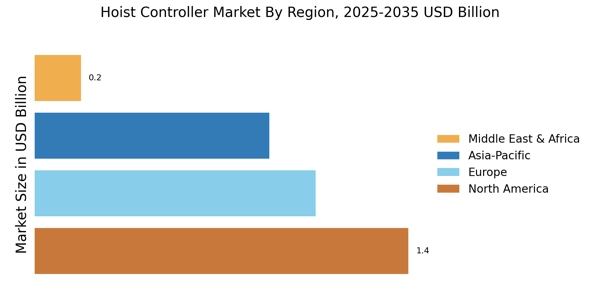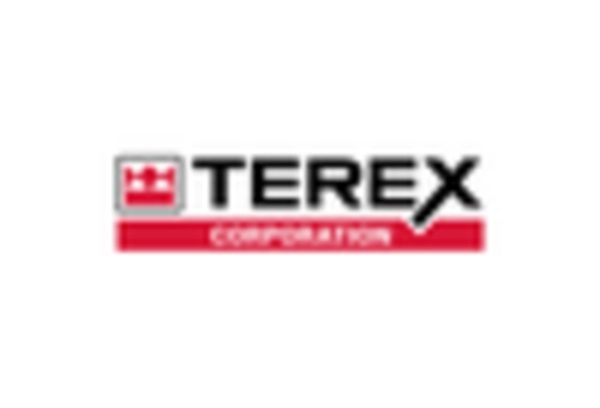Rising Demand for Automation
The hoist controller Market is experiencing a notable surge in demand for automation across various sectors, including construction, manufacturing, and logistics. This trend is driven by the need for enhanced operational efficiency and reduced labor costs. As industries increasingly adopt automated solutions, hoist controllers are becoming integral to modern lifting systems. According to recent data, the market for automated hoist controllers is projected to grow at a compound annual growth rate of approximately 7% over the next five years. This growth is indicative of a broader shift towards automation, where hoist controllers play a pivotal role in streamlining operations and improving safety standards. Consequently, the Hoist Controller Market is likely to witness significant advancements in technology and product offerings to meet this rising demand.
Emphasis on Energy Efficiency
The Hoist Controller Market is increasingly influenced by the emphasis on energy efficiency and sustainability. As industries strive to reduce their carbon footprint and operational costs, there is a growing demand for energy-efficient hoist controllers. These controllers are designed to optimize power consumption during lifting operations, thereby contributing to overall energy savings. Market trends indicate that energy-efficient solutions are becoming a priority for companies looking to enhance their sustainability initiatives. The integration of energy-saving technologies in hoist controllers is expected to drive market growth, with projections suggesting a rise in demand for such products by approximately 6% over the next few years. This focus on energy efficiency not only benefits the environment but also aligns with the economic goals of businesses within the Hoist Controller Market.
Increased Focus on Safety Regulations
Safety regulations are becoming increasingly stringent across various industries, thereby influencing the Hoist Controller Market. Regulatory bodies are mandating the implementation of advanced safety features in lifting equipment, including hoist controllers. This focus on safety is not merely a compliance issue; it is also a critical factor in reducing workplace accidents and enhancing operational reliability. The market is responding to these demands by integrating features such as overload protection, emergency stop functions, and real-time monitoring systems into hoist controllers. As a result, manufacturers are investing in research and development to create innovative solutions that comply with safety standards. This trend is expected to drive growth in the Hoist Controller Market, as companies seek to enhance their safety protocols and ensure compliance with evolving regulations.
Technological Advancements in Hoist Controllers
The Hoist Controller Market is witnessing rapid technological advancements that are reshaping the landscape of lifting solutions. Innovations such as IoT integration, wireless communication, and advanced control algorithms are enhancing the functionality and efficiency of hoist controllers. These technologies enable real-time monitoring and data analytics, allowing operators to optimize lifting operations and reduce downtime. Furthermore, the introduction of smart hoist controllers is facilitating predictive maintenance, which can significantly lower operational costs. Market data suggests that the adoption of these advanced technologies is expected to increase, with a projected market growth rate of around 8% annually. This trend indicates a shift towards more intelligent and connected lifting solutions, positioning the Hoist Controller Market for substantial growth in the coming years.
Growing Construction and Infrastructure Projects
The Hoist Controller Market is benefiting from the ongoing expansion of construction and infrastructure projects worldwide. As urbanization accelerates, there is a heightened demand for efficient lifting solutions in construction sites, warehouses, and manufacturing facilities. Hoist controllers are essential for managing heavy loads safely and effectively, making them indispensable in these projects. Recent statistics indicate that the construction sector is expected to grow by approximately 5% annually, which directly correlates with the increasing need for hoisting equipment. This growth presents a lucrative opportunity for manufacturers in the Hoist Controller Market to innovate and expand their product lines to cater to the evolving needs of the construction sector.

















